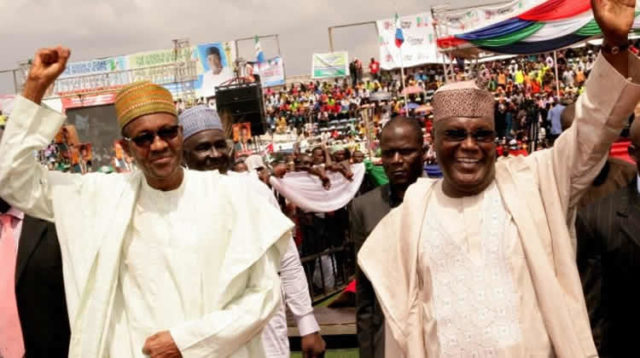Last week, we started the discussion on Islam and Modern Democracy; Evolution and Rulings, a topic which has dominated the Nigerian political landscape for a while now.
Same last week, the Presidential candidates of the two leading political parties in Nigeria emerged ahead of the 2019 general elections.
They are the incumbent, President Muhammadu Buhari of the ruling All Progressives Congress (APC) and Alhaji Atiku Abubakar, the flag bearer of the leading opposition People’s Democratic Party (PDP).
Interestingly, these two candidates are Muslims, and of the same Fulani stock, and their enduring involvement in the electoral process since the advent of the Fourth Republic has triggered heated discussions on scholarly views over Muslim participation in the democratic process.
Muslim scholars’ opinions about contemporary electioneering revolve around its being a means of “witnessing and recommendation” or “authorizing a section of the community to represent the people in the political administration of the land”.
The superior position would be its being a “witness and recommendation”, especially where the decisions of the election or process of selection was handled by the stakeholders.
However, if it is a general election, then it is regarded as a process to determine the people’s wish and satisfaction about who becomes their leader.

Also, in verse 159 of the same chapter, Allah says: “…and consult them in the matter. And when you have decided, then rely upon Allah. Indeed, Allah loves those who rely [upon Him]”.
It is important to note that some differences exist between the contemporary elections and the Islamic Shura Council, some of which are:
(1) Election is a means to leadership, where the choice of the voter to choose among the candidates is determined, unlike the Shura, which is a means to determine the right opinion. The Shurah is inclusive of all affairs of life.
(2) The rule of election is based on the number of votes, while the Shura is based on evidence and proof.
The Judgement of Participation in Elections
The more correct judgement about election in its contemporary form is that it is a permissible way to attain leadership positions, provided it remains the best way to actualize the required benefit, in addition to possessing benefits that outweigh the disadvantages.
Election is permissible since it is in the best interests of the people and the nation. The Islamic Shari’iah has not specified a certain system or way to reach leadership, a reason why the methods by which the Khulafaa attained leadership differed.
It should also be stressed that that the Shariah substantively came to establish benefits and maximize same, while warding off evil and minimizing such.
Therefore, the basic judgement concerning the participation of a Muslim in elections is that it is permissible.
At times, voting could become mandatory, particularly where the better qualified person is restricted or barred from being voted for. At some other times, voting could also be desirable when the voter aims to vote the most qualified person.

In any case, voting must not be done based on self-desire, race or any other consideration different from gaining the pleasure of Allah and aiming for the benefit of the people.
Verdicts of Islamic Scholars on Muslims’ Participation in Non-Islamic Elections Held in Muslim Countries
The participation in elections is related by virtue of participation in the governments that are not implementing Islamic laws, such as what Prophet Yusuf (AS) did.
This is a matter linked with consideration of benefits and disadvantages. Where the benefits are greatest, then participation and voting are desirable, otherwise they are not. Here are some of the fatwas of Islamic scholars:
1. Sheikh Manna Qattan quoted the fatwa of Sheikh Ibn Baaz, may Allah have mercy on him, in his book titled: The Impediments to Apply Islamic Law, where he (Ibn Baaz) was asked about the legitimacy of nomination of the Parliament and the Islamic judgement on collecting voters’ cards in order to vote in Muslim preachers as well as religious persons to the Parliament.
He answered: “The Prophet, peace be upon him said: Actions shall be judged according to intentions, and it is for every person what he intended. There is nothing wrong in joining the People’s Assembly (parliament), if it was intended to support the truth and disapprove falsehood; because that portends victory for the truth and support for the Muslim preachers. Also, there is nothing wrong in collecting voters’ cards, which will be used to elect righteous persons and support the truth …”
2. Shaykh Ibn Uthaymeen also passed a fatwa on the permissibility of participation in elections. He said: “The claim that Parliament is not right and that it is not permissible to participate with the mischievous persons and sitting with them. Do we say: ‘We sit with them to agree with their positions?’ Rather we sit with them to clarify the truth, in order to straighten things out, and when a person contests and fails once, then he could be victorious at other times.”
The Duty of the Muslim
It is the duty of a Muslim who has attained the voting age (18 years in Nigeria) to contribute positively to resolve the issues of his community, according to the Islamic point of view.
Therefore, if the opportunity to partake is given to him as a member of the Parliament who acts on behalf of the nation in the legislative matters or in the selection of the government, he should do so.
This is because, participating in elections as a nominee or as a voter is a form of striving in the cause of Allah. He who withdraws from this responsibility commits a sin, but he who does not participate in the election process; he misses this duty, even though he performs other duties, but it is not a substitute to elections. This does not remove the sin of defaults from him in this respect.
He who participates has the reward. Allah says: “And We place the scales of justice for the Day of Resurrection, so no soul will be treated unjustly at all. And if there is [even] the weight of a mustard seed, We will bring it forth. And sufficient are We as accountant” (Al-Anbiya 21/47).



